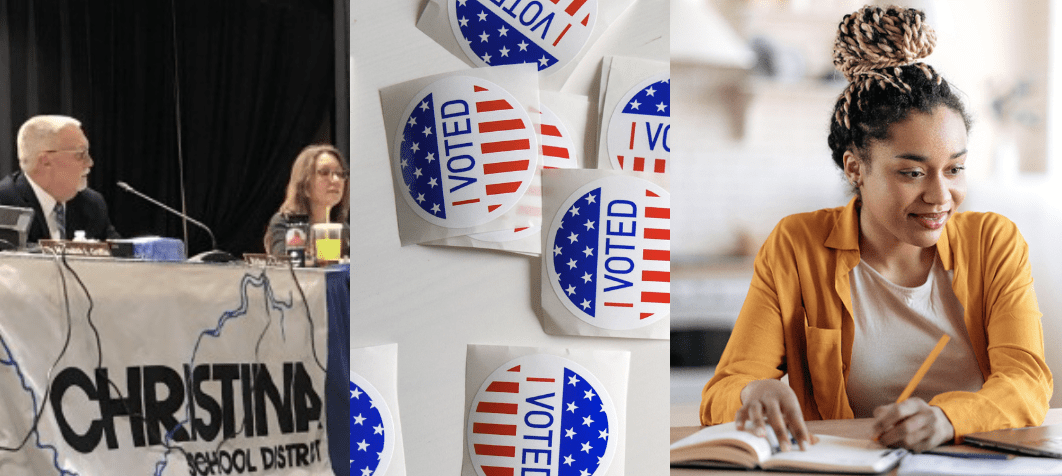Although last week’s school board elections had extremely low voter turnout, one education group points out this year’s numbers rose in many prominent districts.
It has been consistently said that only about 10% of eligible voters hit the polls in school board elections.
Of the 11 school districts that had races this year, just one, Delmar, hit that mark, with 10.03% voter turnout.
Eight districts had less than 5% voter turnout, and four had less than 3%.
Throughout the First State, 480,742 residents were eligible to vote in this year’s elections. Of that, 20,494 votes were cast, only a 4.2% turnout.
In last year’s election, 12 districts had races, and not a single district reached 8% voter turnout. And nine districts had less than 4% turnout. Voter turnout statewide was also just over 4%.
Laurisa Schutt, executive director of First State Educate, a local education advocacy group, said although the numbers are low, they are increasing in some districts.
Delmar’s participation rose 197.63%, Seaford went up 132.16%, Appoquinimink went up 100.45%, Red Clay’s rose 50.17% and Milford’s went up 1.91%. Christina was also up 42% from their last election in 2021.
Three districts had less participation than in 2022’s election: Caesar Rodney’s voter turnout dropped 9.62%, Smyrna’s fell 58.42% and Laurel decreased 6.25%.
“There was no big conclusion to draw from the districts who had more people voting and those that had less,” Schutt said. “But all in all, that is very, very few people voting on leaders who have really consequential decisions to make for our communities.”
John Marinucci, executive director of the Delaware School Boards Association, said the numbers haven’t changed enough to draw conclusions about the state of education in Delaware.
“School board elections have historically had relatively low voter turn-out,” Marinucci said.. “The 2023 school board elections turn-out was, in general, similar to previous years.”
The low voter turnout punctuates one of the concerns the School Board Association has with House Bill 96, which would lower the voting age in school board elections from 18 to 16.
“Because most polling places are in schools, 16- and 17-year-old voters would have disproportionately easier and greater access to polling places, should HB 96 pass,” Marinucci said. “Students are already in the schools and would only need to walk down the hall in order to vote, but other voters need to travel to the polling places in order to vote.”
Due to the historically low voter turnout in school board elections, the 16- and 17-year-old votes can significantly sway, if not determine the election, Marinucci said.
HB 96 was tabled by the House Education Committee May 3. If a bill is tabled, it means the committee will take no further action on it at the time, but it could be brought up again later.
Schutt suggested that there needs to be more awareness of the elections.
“We need the state or the DSBA or somebody to say there’s a school board election in the state and we need billboards on Route 1, we need billboards on I-95,” she said. “A lot of people, if they haven’t heard about it from their friend or neighbor, they just don’t know.”
It’s not a matter of someone choosing not to vote, she said.
It’s about residents not knowing they’re supposed to vote, where to vote or how to vote.
The work should start now, she said, to start getting the word out about 2024’s school board elections so that there’s more competition in the races and more people come out to vote.
Delaware has school board elections each year, but each district does not.
Schutt also said the elections should focus more on crucial issues like the state’s teacher shortage, which is one of the worst in the nation, and how to combat learning loss, which was exacerbated by the pandemic.
“We can’t hide from our learning loss,” she said. “It is nobody’s fault, but it is also our responsibility going forward.”
These are really crucial issues that should be leading elections, she said, versus book banning or curriculum manipulation or arming teachers, all of which she heard about from voters at the polls in last Tuesday’s election.
“Congratulations to everybody who is now new in the seat,” she said. “Let’s get to work, let’s get to work.”


Raised in Doylestown, Pennsylvania, Jarek earned a B.A. in journalism and a B.A. in political science from Temple University in 2021. After running CNN’s Michael Smerconish’s YouTube channel, Jarek became a reporter for the Bucks County Herald before joining Delaware LIVE News.
Jarek can be reached by email at [email protected] or by phone at (215) 450-9982. Follow him on Twitter @jarekrutz
Share this Post



